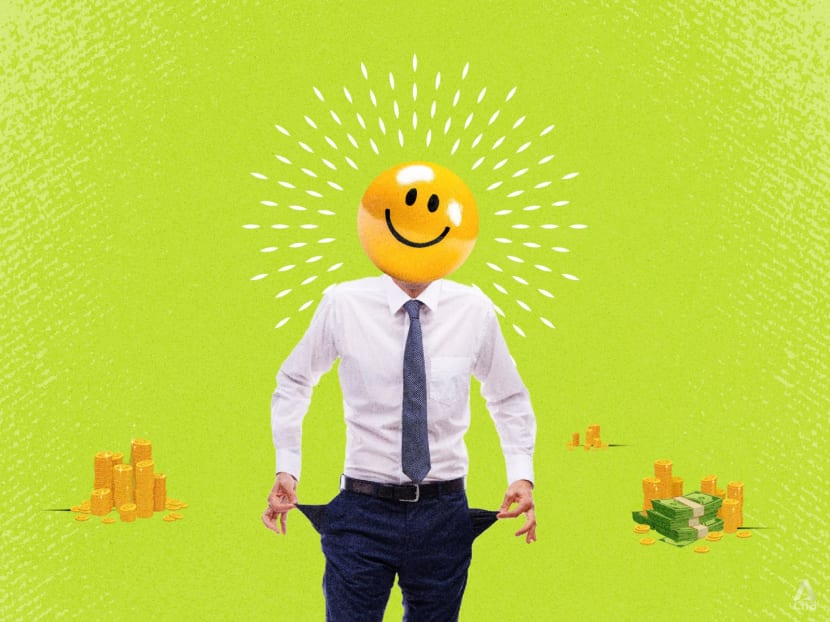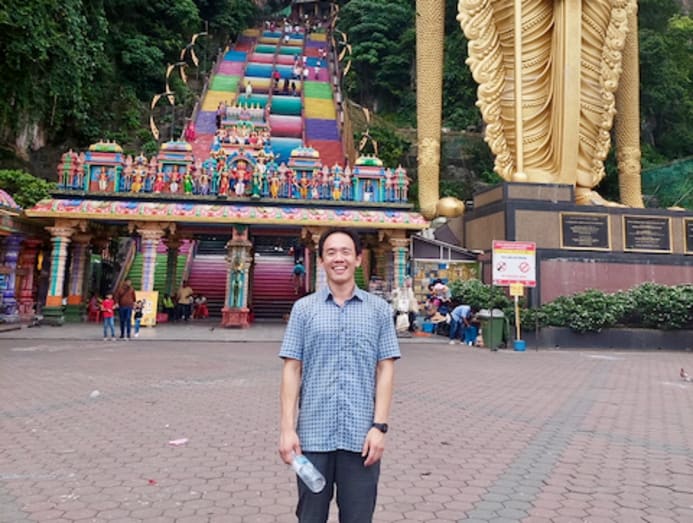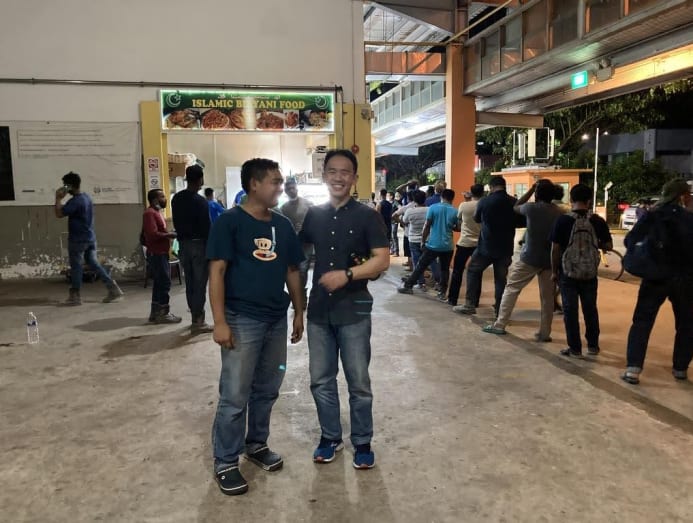I was bitter about having less money than others. But I've decided to stop robbing myself of joy
John Lim has never had a lot of money, but he has never really been destitute either. He asks himself: "Why do I always feel so poor?"

Mr John Lim has struggled to find happiness in times of financial struggle, but also in times of financial stability. (Illustration: CNA/Samuel Woo)

This audio is generated by an AI tool.
When was the hungriest you’ve ever been? Would you eat scraps from somebody else’s table?
There’s a memory I have from September 2022.
I’d finished my fourth banana of the day, but I was still hungry. On my way home, I passed by a Starbucks, where something caught my eye: A plate of half-eaten cake, abandoned by a recently departed patron.
I stopped in my tracks, then went to sit down at the table.
I looked at the cake. It was just a regular Starbucks cake – but I hadn’t had such fancy cake in a long time.
I picked up the fork.
Just then, a cafe employee walked out with her tray. I quickly put the fork down, got up and left.
On my way home, I thought about how far I had sunk.
At the time, I was only earning S$700 a month and had just crossed the one-year mark of being unable to find a full-time job. But I had S$49,000 socked away in stocks and about S$3,000 in the bank.
Sure, I wasn’t living the high life – but I wasn’t exactly destitute either. What was it that made me feel this poor?
Part of it was the constant doom and gloom around uninspiring economic prospects. Every day, there seemed to be a fresh news article or social media post about rising inflation and costs, and how we needed to tighten our belts and forgo spending on wants.
A slice of cake wasn’t a need – it was a want. Therefore, I shouldn’t have it.
It took me some time and deeper digging to finally realise that a larger part of it was the pressure of comparison with friends and peers weighing on me.
THE TYRANNY OF COMPARISON
During meals and meet-ups with friends, conversations were dominated by a few familiar suspects: Their upcoming weddings, applications and renovations for their Build-to-Order flats, raises and promotions at work.
I congratulated them, of course – but honestly, I found it hard to feel happy for them.
They talked about their holidays to exotic places like Zurich in Switzerland and Sydney in Australia. I dwelled bitterly on the fact that the furthest I’d ventured in recent memory was Johor Bahru in Malaysia, for work.
When meeting new people, my friends would announce their jobs. “I’m a doctor.” “I’m a crypto lawyer.” “I’m a software engineer at a global bank.”
When it came to me, I’d say: “I’m a writer.” New acquaintances would smile and say: “Oh, that’s so cool!” My ears would grow hot and I would think: “No, it’s not cool. You’re just being nice.”
Like my friends, I was in my late 20s. Unlike them, I was single with no full-time job and no place of my own.
The lack of money, compared to others, was a constant drag on my self-esteem. I couldn’t help but feel sorry for myself – like a loser.

CAN MONEY BUY HAPPINESS?
In May 2022, I came across a group of teenagers playing street football at a neighbourhood court near my home. Somehow, I plucked up the courage to ask to join them. They welcomed me.
Never did I think it would become the biggest source of joy for me. There’s no stress, no pressure to perform. Just show up each Friday and play.
On the other hand, there was never any certainty. Sometimes, I’d turn up on a Friday night and no one would be there.
Over time, it became a lesson for me: I had to let go of my expectations, trust in spontaneity and embrace the possibility of things not going according to plan.
We’re always told “money can’t buy happiness”. But as we grow up, most of us quickly learn that money can indeed buy some happiness: A nicer bag, a new phone, a bougie holiday.
In the two years that I enjoyed the stability of a full-time income, I spent money on so many things, thinking they would make me happy.
I shelled out for long flights to London. I splurged on a S$197 mouse that I used once. I paid for expensive hotpot meals.
But I often found the emotional uplift was always temporary, never lasting more than a few weeks. My smile would stop at the face, but never really reached my heart.
Eventually, I realised there’s a difference between the happiness that money can buy and the happiness money can’t.
It’s the difference between pleasure and joy.
PLEASURE VERSUS JOY
Put very simply, pleasure is a state of doing. You chase after short-term experiences. You pay for things you can see and touch, but after the high of the purchase dies, so does the pleasure of the new acquisition.
Joy is a longer-term state of being that is focused not just on what you do, but the expression of who you are at your core. You may not be able to see or touch these things, but you feel them – like the excitement of running to the football court to play because you want to.
I’m not saying that paying for products and services is bad, but the pleasure we find from these experiences is temporal – here today, gone tomorrow.
So what can we do to find real, lasting joy, instead of settling for the pricey but pale imitation of it?
It starts with realising that just because we can buy some happiness doesn’t mean it’s the only route to feeling happy.
FIGHT FOR JOY
In July 2022, during one of my toughest financial periods, I had the chance to work on an article on construction workers in Singapore. I immersed myself in their daily lives to better understand their hardships, even bunking with them in dormitories.
That night, I had dinner at the recreation area near their dormitories. Meal options started from S$2.30, way cheaper than food sold outside.
Nevertheless, I held back. I had stopped buying food outside for a few months by then, packing food from home everywhere I went instead. This food was arguably dirt cheap – even so, the S$300 I would earn from the article would not cover some of these expenses.

The construction worker with me earned just S$400 a month. Not missing a beat, he took out some cash from his wallet and bought me some food.
Smiling, he pointed at the food and said: “Eat. It’s nice.”
Despite having little, he gave freely. Despite a sparse living, he insisted on making the most of his circumstances.
Somehow, that one encounter taught me about a better approach towards joy than all the months I’d spent soul-searching.
Financially, I had so much more than him. But I was constantly thinking from a place of lack and having a never-ending hunger for more.
Yes, I might never have a lot of money, but my physical poverty was never as severe as the poverty of my own heart.
If I’d stepped back, I would’ve seen that the reason I felt so poor was because I validated the reasons I should feel poor.
I compared myself to friends who were better off, instead of what I needed to take care of myself. I compared my job to the more lucrative or prestigious ones my peers had, instead of my own passions and skills.
I gave nothing to no one – including myself – because I thought I had nothing.
No one ever told me, “You should try to be richer. Why don’t you earn more money?” It was always in my own head.
I now see that joy isn’t really something I can buy or find by chance – it’s something I have to fight for. I’m learning to fight against my natural instincts to compare myself to others or to arbitrary standards.
And in this fight, I’m now better prepared to make sure that my greatest opponent isn’t myself.
John Lim is the owner of content agency Media Lede and the author of Take Heart: Thriving in the Emotional Wilderness. He regularly writes at liveyoungandwell.com.
If you have an experience to share or know someone who wishes to contribute to this series, write to voices [at] mediacorp.com.sg with your full name, address and phone number.







.jpg?itok=CdUmaUmt)
.jpg?itok=Zqv2Fcaz)





